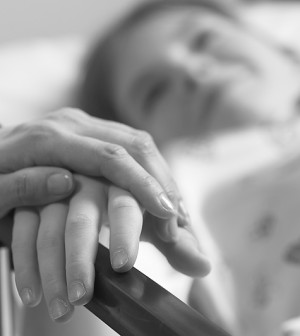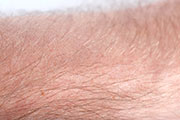- Could Your Grocery Store Meat Be Causing Recurring UTIs?
- Are You Making This Expensive Thermostat Error This Winter?
- Recognizing the Signs of Hypothyroidism
- 10 Strategies to Overcome Insomnia
- Could Artificial Sweeteners Be Aging the Brain Faster?
- Techniques for Soothing Your Nervous System
- Does the Water in Your House Smell Funny? Here’s Why
- Can a Daily Dose of Apple Cider Vinegar Actually Aid Weight Loss?
- 6 Health Beverages That Can Actually Spike Your Blood Sugar
- Treatment Options for Social Anxiety Disorder
Hairless Man Now Hairy, Thanks to Arthritis Drug


A man with a rare condition that left him with no hair on his body grew a full head of hair after taking an arthritis drug, a new study reveals.
The 25-year-old patient also grew eyebrows and eyelashes, along with facial, armpit and other hair after treatment with tofacitinib citrate.
The man’s lack of body hair was caused by a disease called alopecia universalis. The researchers said this is the first reported case of a successful targeted treatment for the disorder, which has no cure or long-term treatment.
“The results are exactly what we hoped for,” study senior author Dr. Brett King, an assistant professor of dermatology at Yale University School of Medicine, said in a university news release.
“This is a huge step forward in the treatment of patients with this condition,” King said. “While it’s one case, we anticipated the successful treatment of this man based on our current understanding of the disease and the drug. We believe the same results will be duplicated in other patients, and we plan to try.”
The patient took 10 milligrams a day of the arthritis drug, according to the study, published online June 18 in the Journal of Investigative Dermatology.
After two months, he began to grow scalp and facial hair, the first hair he’d grown in these areas in seven years. After three more months taking 15 milligrams a day of the drug, he had a full head of hair and clearly visible eyebrows and eyelashes, as well as facial, armpit and other hair.
After eight months, the man had full re-growth of his body hair. He reported feeling no side effects and lab tests detected no problems.
It’s likely that the drug triggered hair re-growth by switching off the immune system attack on hair follicles that occurs in people with alopecia universalis, said King.
Tofacitinib citrate (marketed as Xeljanz) is used to treat rheumatoid arthritis. King next hopes to conduct a clinical trial to test a cream form of tofacitinib citrate in treating people with alopecia universalis.
More information
The U.S. National Institutes of Health has more about alopecia universalis.
Source: HealthDay
Copyright © 2026 HealthDay. All rights reserved.










